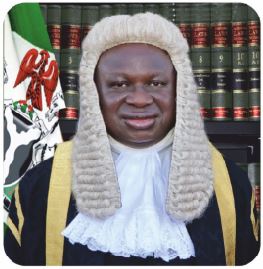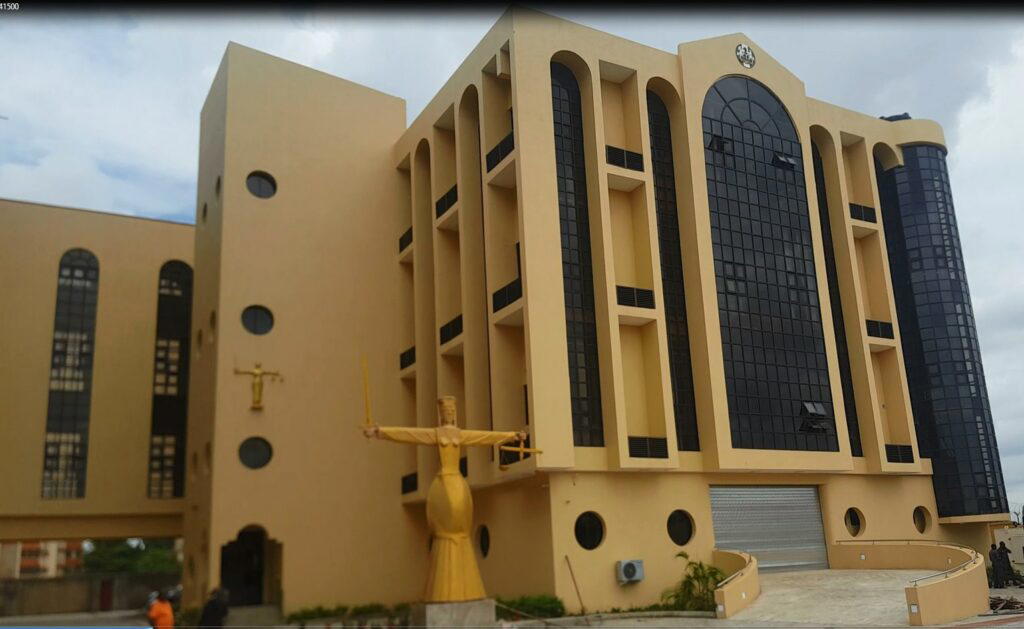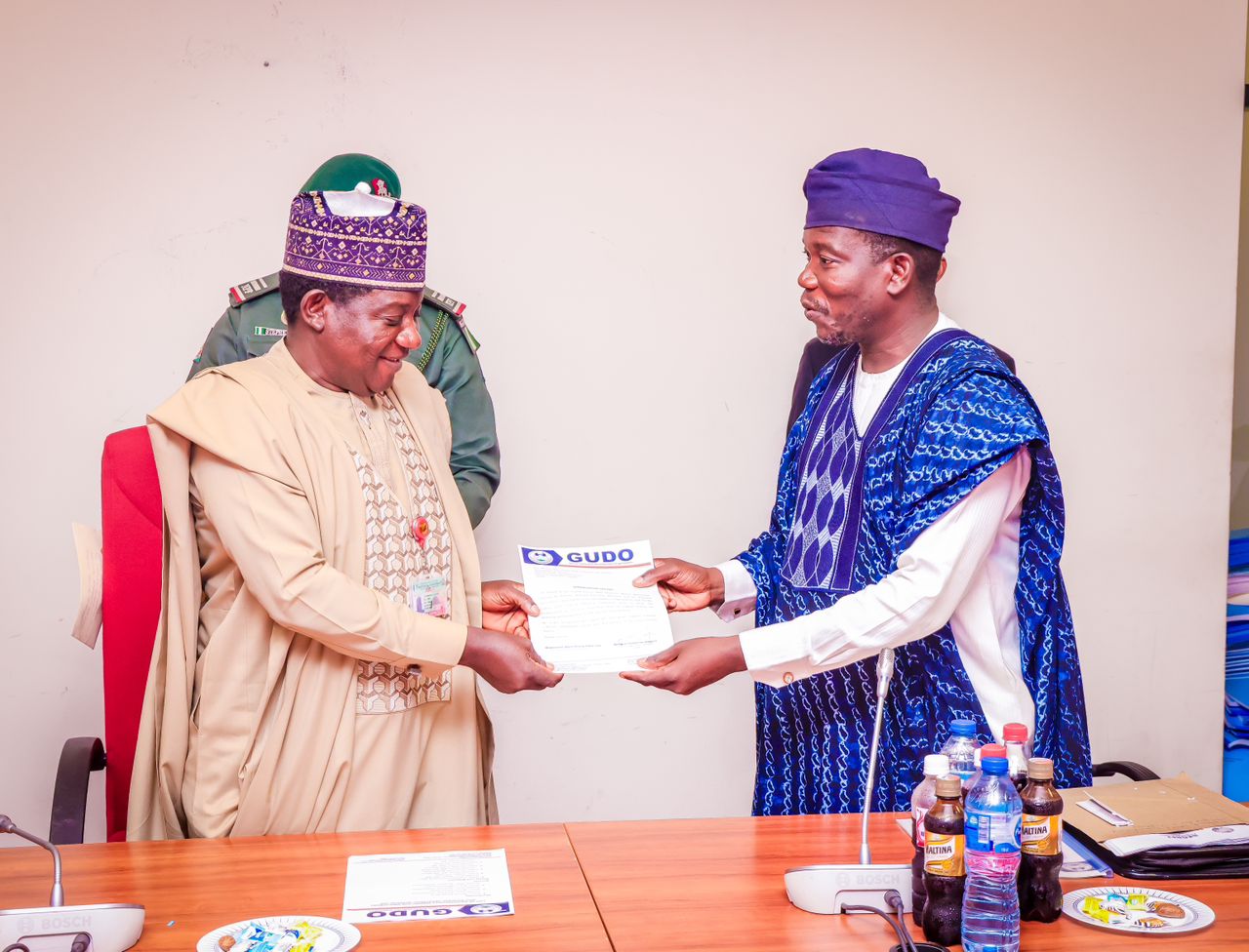Court to NASS, 3 Ors: Pay Judicial Officers Befitting, Realistic, Commensurable Salaries and Other Emoluments

IN THE NATIONAL INDUSTRIAL COURT NIGERIA
IN THE ABUJA JUDICIAL DIVISION
HOLDEN AT ABUJA
BEFORE HER LADYSHIP HON. JUSTICE O.A. OBASEKI-OSAGHAE
DATE:JULY 15, 2022 SUIT NO. NICN/ABJ/142/2022
BETWEEN:
CHIEF SEBASTINE TAR. HON, SAN, FCIArb………………………. CLAIMANT
AND
1. NATIONAL ASSEMBLY
2. REVENUE MOBILISATION ALLOCATION
AND FISCAL COMMISSION (RMAFC) DEFENDANTS
3. ATTORNEY-GENERAL OF THE FEDERATION
AND MINISTER OF JUSTICE
4. NATIONAL JUDICIAL COUNCIL

Introduction: The Court gave an Order of Mandatory Injunction compelling relevant Government Agencies; the National Assembly; Revenue Mobilisation, Allocation and Fiscal Commission ( RMAFC); Attorney-General of the Federation (AGF) and the National Judicial Council (NJC), to forthwith, put in place or activate legal and administrative machineries to commence payment to all listed Judicial officers the following befitting, realistic and commensurable salaries and other emoluments estimated to be reasonable having regards to the existing socio-economic and other factors…
An Order of Mandatory Injunction compelling Revenue Mobilisation, Allocation and Fiscal Commission ( Or any other statutory or administrative body that would be subsequently charged with such responsibilities as RMAFC to, in perpetuity review and continue to embark upon and carry out, in conjunction with the NJC, a yearly or at most a two-yearly review of the salaries and allowances of the Judicial officers listed above , with a view to making the said salaries and emoluments realistic and befitting of the offices and duties attached to/ be exercised by such officers.
Below is the full judgement:
JUDGMENT
Introduction and Reliefs
[1] The claimant commenced this action by Originating Summons on 04 May 2022 praying for the determination of the following questions:
(1) Whether, by a combined interpretation of sections 4(1) & (2) and 81(1)-(4) of the Constitution of the Federal Republic of Nigeria, 1999, as amended, read in conjunction with section 6(1)(d) and Parts A and B of the First Schedule to the Revenue Allocation Mobilization and Fiscal Commission Act, Cap. R7, Laws of the Federation of Nigeria, 2004, the 1st and 2nd Defendants have unbridled, whimsical and untrammeled powers to arbitrarily and unreasonably refuse, fail or neglect to upwardly review the basic salaries and allowances of the Chief Justice of Nigeria and other Justices of the Supreme Court; the President and other Justices of the Court of Appeal; the Chief Judge and other Judges of the Federal High Court; the President and Judges of the National Industrial Court; the Chief Judges and other Judges of the various State High Courts; the Chief Judge and other Judges of the Federal Capital Territory High Court, Abuja; the Grand Khadi and other Khadis of the States and FCT Sharia Courts of Appeal and the Presidents and Judges of the various Customary Courts of Appeal of the State and of the FCT, Abuja.
(2) ALTERNATIVELY OR IN ADDITION TO THE ABOVE: Whether, by a combined interpretation of sections 4(1) and (2), 6(1), (3), (5)(a)-(j) and (6) and 81(1)-(4) of the Constitution of the Federal Republic of Nigeria, 1999, as amended, read in conjunction with section 6(1)(d) and Parts A and B of the First Schedule to the Revenue Allocation Mobilisation and Fiscal Commission Act, Cap. R7, Laws of the Federation of Nigeria, 2004, this Honourable Court has jurisdiction or is under duty to compel the 1st and 2nd Defendants to exercise their constitutional and statutory discretionary powers to upwardly review the basic salaries and allowances of the Judicial Officers listed/named above.
(3) Whether a combined interpretation of sections 84(1) of the Constitution of the Federal Republic of Nigeria, 1999 as amended, read in conjunction with section 6(1)(b) and (d) and parts A and B of the First Schedule to the Revenue Allocation Mobilization and Fiscal Commission Act, Cap. R7, Laws of the Federation of Nigeria, 2004, the 2nd Defendant has not shirked its constitutional responsibility of fixing higher salaries and allowances for the Judicial Officers named above, by permitting, suffering and even enabling the 1st Defendant, by the instrumentality of Part II of the Certain Political, Public and Judicial Office Holders (Salaries and Allowances, etc.) (Amendment) Act, 2008, to stagnate (and or maintain since 2008) extremely low salaries and allowances for the Judicical Officer named above.
(4) Whether, by a combined reading of the provisions of section 6(1)(b) and (d) and Parts A and B of the First Schedule to the Revenue Allocation Mobilization and Fiscal Commission Act, Cap. R7, Laws of the Federation of Nigeria, 2004, it is constitutional and lawful for the 2nd Defendant to refuse, fail, neglect or ignore to upwardly review the salaries and allowances of the Judicial Officers listed above, notwithstanding changing local and international socio-economic realities.
(5) Upon resolution of questions 1, 2 (in the alternative/in addition), 3 and 4 above, whether the current salaries and other emoluments paid the respective Judicial Officers listed above is not embarrassingly too low and unrealistic, given the current socio-economic and other conditions existing in Nigeria and the current global comparative salaries and allowances paid to Judicial Officers of the same or similar cadre listed hereinbefore.
[2] Upon the determination of the questions in favour of the Claimant, he is seeking the following reliefs against the Defendants:
(1) A Declaration that, by a combined interpretation of sections 4(1) & (2) and 81(1)-(4) of the Constitution of the Federal Republic of Nigeria, 1999, as amended, read in conjunction with section 6(1)(d) and Parts A and B of the First Schedule to the Revenue Allocation Mobilization and Fiscal Commission Act, Cap. R7, laws of the Federation of Nigeria, 2004, the 1st and 2nd Defendants do not have unbridled, whimsical and untrammeled powers to arbitrarily and unreasonably refuse, fail or neglect to upwardly review the basic salaries and allowances of the Chief Justice of Nigeria and other Justices of the Supreme Court; the President and other Justices of the Court of Appeal; the Chief Judge and other Judges of the Federal High Court, the President and Judges of the National Industrial Court; the Chief Judges and other Judges of the various state High Courts; the Chief Judge and other Judges of the Federal Capital Territory High Court, Abuja; the Grand Khadi and other Khadis of the States’ and FCT Sharia Courts of Appeal and the Presidents and Judges of the various Customary Courts of Appeal of the State and of the FCT, Abuja.

(2) A Declaration that by a combined reading of the provisions of section 6(1)(b) and (d) and parts A and B of the First Schedule to the Revenue Allocation Mobilization and Fiscal Commission Act, Cap. R7, Laws of the Federation of Nigeria, 2004, it is unconditional, null and void for the 2nd Defendant to refuse, fail, neglect or ignore to upwardly review the salaries and allowances of the Judicial Offices listed above, notwithstanding the changing local and international socio-economic realities.
(3) A Declaration that the current salaries and other emoluments paid by the 2nd Defendant through the 4th Defendant to the respective Judicial Officers listed above since 2008 is embarrassingly too low and unrealistic, given the current socio-economic and other realities existing in Nigeria and the current global comparative salaries and allowances paid to Judicial Officers of the same or similar cadre listed hereinbefore.
(4) An Order of Mandatory Injunction compelling the 1st-4th Defendants to, FORTHWITH, put in place or activate legal and administrative machineries to commence payment to the Judicial Officers listed above the following befitting, realistic and commensurate salaries and other emoluments, estimated to be reasonable, having regard to the existing socio-economic and other factors, as follows:
(a) Chief Justice of Nigeria: Minimum of N12 Million monthly;
(b) Each of the justices of the Supreme Court: Minimum of N11 Million monthly;
(c) President of the Court of Appeal: Minimum of N11 Million monthly;
(d) Each Justice of the Court of Appeal: Minimum of N10 Million monthly;
(e) Chief Judge of the Federal High Court: Minimum of N10 Million monthly;
(f) Each Judge of the Federal High Court: Minimum of N8 Million monthly;
(g) President of the National Industrial Court: Minimum of N10 Million monthly;
(h) Each Judge of the National Industrial Court: Minimum of N9 Million monthly;
(i) Chief Judge of each State High Court: Minimum of N10 Million monthly;
(j) Each Judge of a State High Court: Minimum of N9 Million monthly;
(k) Chief Judge of the FCT High Court: Minimum of N10 Million monthly;
(l) Each Judge of the FCT High Court: Minimum of N9 Million monthly;
(m) Grand Khadi of the Sharia Court of Appeal of the FCT
And of each State that has it:Minimum of N8 Million monthly;
(n) Khadi of the Sharia Court of Appeal of the FCT and each State
That has such a Court: Minimum of N7 Million monthly;
(o) President of the Customary Court of Appeal of the
FCT and each State that has such a Court: Minimum of N8 Million monthly;
(5) An Order of Mandatory injunction compelling the 2nd Defendant (or any other statutory or administrative body that would be subsequently charged with such responsibilities as the 2nd Defendant) to, in perpetuity, review and continue to embark upon and carry out, in conjunction with the 3rd Defendant, a yearly or at most a two-yearly review of the salaries and allowances of the Judicial Officers listed above, with a view to making the said salaries and emoluments realistic and befitting of the offices and duties attached to/exercised by such offices.
The Originating Summons is supported by an affidavit of 39 paragraphs sworn to by Claimant on 4th May 2022 and to which is annexed exhibits marked STHI to STHI8; and a written address dated 3rd May, 2022 and filed on 4th May, 2022.
[3] The 1st Defendant in opposing the Originating Summons filed a Notice of Preliminary Objection (NPO) to the suit dated 24th June 2022 and filed the same day. The Objection is supported by an affidavit sworn to by Aliyu Garba, Legal Officer, and a written address also dated 24th June, 2022. The 3rd Defendant in opposing the Originating Summons filed a counter affidavit that was sworn to by Michael Oni, litigation officer, and a written address in support dated 10th June, 2022. The 4th Defendant in response to the Originating Summons filed a counter affidavit sworn to by Meshack Sunday Pmabi, Principal Legal Officer, on 24th June 2022, and written address dated 23rd June 2022.
In reaction to the 1st Defendant’s NPO, the Claimant filed a reply address on 24th June, 2022; and to the 3rd Defendant’s processes, the Claimant on 20th June 2022 filed a further affidavit and a reply on point of law. On 27th June 2022, the Claimant filed a reply on point of law in reaction to the 4th Defendant’s processes.
The 2nd Defendant failed to enter appearance or file any process in its defence.
THE CASE OF THE CLAIMANT
Facts
[4] The facts upon which the Claimant has premised the questions for determination and the reliefs he is seeking are as contained in his supporting affidavit. To state the Claimant’s case concisely, he is a Senior Advocate of Nigeria elevated to the Inner Bar in 2008. He is aspiring to be appointed either a Justice of the Supreme Court, or of the Court of Appeal, or at least a Judge of the High Court; but the salaries and allowances paid the Justices and Judges of these Courts is too poor for him, given the current socio-economic realities. The Claimant states that the poor mode of determining or reviewing salaries and allowances of Judges is also scaring him away from applying to be appointed to any of the Benches even though he is ably and fittingly qualified to so apply and be appointed.
[5] The Claimant states that he knows that the 1st and 2nd Defendants have constitutional and statutory powers to review the salaries of Judicial Officers in Nigeria but have not done so since 2008. He states that for about 14 years, the basic salaries and allowances of the Judicial Officers has not been reviewed upwards, notwithstanding the loss of value of the Naira vis-à-vis other global currencies like the US Dollars, the British Pound Sterling and the European Union (EU) Euro, etc. The Claimant states that the Chief Justice of Nigeria, and the President of the Court of Appeal have on different occasions, publicly decried the poor pay of Justices and Judges in Nigeria; and that other well-meaning Nigerians, Institutions and Newspaper Editorials have, in a ceaseless manner, harped on the same issue. The Claimant states that salaries of Justices of the US Supreme Court, and other Judicial Officers are upwardly reviewed on a yearly basis; and that Judicial Officers in Ghana keep enjoying increased salary scales as years pass by.
[7] The Claimant states that he is aware that foreigners who have been hired from time to time to coach Nigeria’s national football teams earn higher than Nigeria’s Judicial Officers. That he knows as a Legal Practitioner who has practiced in all the levels of Courts in Nigeria that poor pay for Judicial Officers is seriously affecting the quality of judgments and rulings that are delivered; and the discharge of other functions associated with their offices.

Submission of the Claimant
[8] The issues submitted are the legal questions the claimant has framed in paragraph [1] above. These questions are numbered as issues (1) to (5); and for ease of reference they are again reproduced seriatim as follows:
(1) Whether, by a combined interpretation of sections 4(1) & (2) and 81(1)-(4) of the Constitution of the Federal Republic of Nigeria, 1999, as amended, read in conjunction with section 6(1)(d) and Parts A and B of the First Schedule to the Revenue Allocation Mobilization and Fiscal Commission Act, Cap R7, Laws of the Federation of Nigeria, 2004, the 1st and 2nd Defendants have unbridled, whimsical and untrammeled powers to arbitrarily and unreasonably refuse, fail or neglect to upwardly review the basic salaries and allowances of the Chief Justice of Nigeria and other Justices of the Supreme Court; the President and other Justices of the Court of Appeal; the Chief Judge and other Judges of the Federal High Court ; the President and Judges of the National Industrial Court; the Chief Judges and other Judges of the various State High Courts; the Chief Judge and other Judges of the Federal Capital Territory High Court; the Grand Khadi and other Khadis of the States’ and FCT Sharia Courts of Appeal and the Presidents and Judges of the various Customary Courts of Appeal of the State and of the FCT, Abuja.
(2) Whether, by a combined interpretation of sections 4(1) and (2), (6(1), (3), (5)(a)-(j) and (6) and 81(1)-(4) of the Constitution of the Federal Republic of Nigeria, 1999, as amended, read in conjunction with section (6(1)(d) and Parts A and B of the First Schedule to the Revenue Allocation Mobilization and Fiscal Commission Act, CapR7, Laws of the Federation of Nigeria, 2004, this Honourable Court has jurisdiction or is under duty to compel the 1st and 2nd Defendants to exercise their constitutional and statutory discretionary powers to upwardly review the basic salaries and allowances of the Judicial Officers listed/named above.

(3) Whether a combined interpretation of sections 84(1) of the Constitution of the Federal Republic of Nigeria, 1999 as amended, read in conjunction with section (6)(1)(b) and (d) and Parts A and B of the First Schedule to the Revenue Allocation Mobilization and Fiscal Commission Act, Cap R7, Laws of the Federation of Nigeria, 2004, the 2nd Defendant has not shirked its constitutional responsibility of fixing higher salaries and allowances for the Judicial Officers named above, by permitting, suffering and even enabling the 1st Defendant, by the instrumentality of Part II of the Certain Political, Public and Judicial Office Holders (Salaries and Allowances, etc.) (Amendment) Act, 2008, to stagnate (and or maintain since 2008) extremely low salaries and allowances for the Judicial Officer named above.
(4) Whether, by a combined reading of the provisions of section 6(1)(b) and (d) and parts A and B of the First Schedule to the Revenue Allocation Mobilization and Fiscal Commission Act, Cap. R7, Laws of the Federation of Nigeria, 2004, it is constitutional and lawful for the 2nd Defendant to refuse, fail, neglect or ignore to upwardly review the salaries and allowances of the Judicial Officers listed above, notwithstanding changing the local and international socio-economic realities.
(5) Whether the current salaries and other emoluments paid the respective Judicial Officers listed above is not embarrassingly too low and unrealistic, given the current socio-economic and other conditions existing in Nigeria and the current global comparative salaries and allowances paid to Judicial Officers of the same or similar cadre listed hereinbefore.
[9] In arguing the Originating Summons, learned Counsel to the Claimant Asiwaju S.A. Awomolo SAN relied on all the paragraphs of the supporting affidavit and the exhibits annexed. He adopted all the arguments contained in the written submissions, and argued the 5 issues together.
[10] Learned Senior Counsel referred to the provisions of Section 84 (1), (2), (3), & (4) of the 1999 Constitution and submitted that there are three inescapable constructions namely: the Judicial Officers listed in subsection (4) are to, within the facts of this case, enjoy the salaries and allowances as may be prescribed by the 1st Defendant; that notwithstanding this, the 2nd Defendant enjoys discretion to ‘determine’ that the said Judicial Officers need and ought to be paid higher salaries and allowances gathered from the phrase “but not exceeding the amount as shall have been determined by the Revenue Mobilization Allocation and Fiscal Commission” in Section 84(1); and that the salaries and allowances shall be a charge on the Consolidated Revenue Fund of the Federation; and shall not be altered to the disadvantage of the said Judicial Officers.

[11] Learned Senior Counsel submitted that by Section 84(1) of the Constitution, the National Assembly is to “prescribe” the salaries and allowances of the Judicial Officers listed in Section 84(4). That in furtherance of this, 1st Defendant enacted the Certain Political, Public and Judicial Office Holders (Salaries and Allowances, etc.) Act No. 6 of 2002, which was amended by the Certain Political, Public and Judicial Office Holders (Salaries and Allowances, etc.) Act No. 1 of 2008. He referred to the Ibrahim v. Barde (1996) 9 NWLR (Pt. 474) 513, (1996) 12 SCNJ 1 where the Supreme Court held that when a statute gives power to a person to prescribe rules or regulations, the donee of such power is imbued with authority to make a subsidiary legislation, which if made, becomes binding.
[12] Learned Senior Counsel then referred to Section 4 91) & (2) of the 1999 Constitution as amended, which provides:
(1) The legislative powers of the Federal Republic of Nigeria shall be vested in a national Assembly for the Federation which shall consist of a Senate and a House of Representative.
(2) The National Assembly shall have power to make laws for the peace, order and good government of the Federation….
He questioned what would happen if the National Assembly is either found not to have enacted and Act which amongst other things, is not capable of enthroning or ensuring the peace, order and good government of the Federation.
He questioned what would happen if the National Assembly is either found not to have enacted an Act which amongst other things, is not capable of enthroning or ensuring the peace, order and good government of the Federation. And that related to this is whether the National Assembly, no matter the sociological and economic factors that would evolve several years after enacting an Act, will still hold onto such Act, without amending it; for the same purpose of ensuring the peace, order and good government of the Federation.
[13] Learned Senior Counsel queried whether it is right for the National Assembly to refuse to amend a crucial but obsolete law like the Act of 2008, in spite of the menacing and extremely challenging situations that may arise in the future – in this case, more than 12 years afterwards; and whether the courts have power to intervene in such situations? He cited All Progressives Congress vs. E.S.I.E.C. (2021) 16 NWLR (Pt. 1801) 1 at 65f-66B, and 68C-D SC where the Supreme Court per Salauwa JSC held:
Fundamentally, the Constitution of the Federal Republic of Nigeria, 1999 as amended has provided for three distinct branches of Government:
(i) The Legislature
(ii) The Executive; and
(iii) The Judiciary.
And to each of the formidable arms of Government, the Constitution has assigned well defined, distinct roles and responsibilities. To the Legislature, the distinguished role of enacting laws for the peace, order and good government of the nation. To the Executive, the eminent responsibility and duty for execution and implementation of all laws enacted by the legislature and orders of courts. While to the Judiciary, the Constitution has equally assigned the prestigious and most honourable judicial powers to thereby arbitrate and settle disputes vis-à-vis conflicts arising from the interplay of powers and forces between the Federal and State Governments, between the Government and citizen, and between individuals and institutions vis-à-vis other feuding parties. See sections 4, 5 and 6 of the 1999 Constitution.

And 68C-D where the court succinctly expounded the position:
In the Course of interpreting the Constitution, it then behooves the court to consider the Constitution in its entirety as a whole. That’s to say, the provisions of the Constitution ought to be construed in such a way as to justify the aspirations and hopes of the framers thereof vis-à-vis the laudable objectives of promoting good Government and welfare of the citizens on the principles of freedom, equality, justice, peace and unity of the people.
[14] It was the argument of learned Senior Counsel to the Claimant that poor pay for Judicial Officers, who ma the temples of justice, is resulting in poor quality judgments; hence “good Government” on the part of this 3rd arm of Government is being eroded. He referred to the definition of the word “good” by the Supreme Court in GTB Plc vs. Est Master Construction Ltd. (2019) All FWLR (Pt. 999) 351 at 384F-G SC, and submitted that the working of the judiciary or judicial system cannot be smooth if Justices and Judges of superior courts of record in Nigeria are not well paid; and cited A.D.H. Ltd. vs. Amalgamated Trustees Ltd (No. 2) (2007) All FWLR (Pt. 1781 at 1824G-H SC.
[15] Learned Senior Counsel argued that the provision of the Certain Political, Public and Judicial Office Holders (Salaries and Allowances, Etc.) (Amendment) Act No. 1 of 2008, as far as they apply to the salaries and allowances of Judicial Officers who are the only subjects of this suit, have become obsolete. He submitted that the 1st Defendant, is under obligation to amend the Act to meet up with current socio-economic realities and cited Iloabache vs. Philips (2002) FWLR (Pt. 115) 726 at 747 CA for the meaning of an obsolete enactment or provision. He then urged the court, in the event of all the submissions not being convincing to invoke the doctrine of necessity in granting the Claimant’s reliefs, relying on the decision of the Supreme Court in Nyesom vs. Peterside (2016) All FWLR (Pt. 824) 38 at 112H-113A Sc, and the provisions of Section 6(1), (5) and (6) of the 1999 Constitution as amended.
[16] Learned Senior Counsel stated that the 1st Defendant enacted the Revenue Allocation Mobilization and Fiscal Commission Act (RMAFC Act), Cap. R7, LFN and referred to the provisions of Section 6(1) (b) and (d):
(1) The Commission shall have power to-
(a) ……………………………………………………
(b) Review, from time to time, the revenue allocation formulae and principles in operation to ensure conformity with changing realities.
(c) ………………………………………………………
(d) Determine the remuneration appropriate to the holders of the offices as specified in Parts A and B of the First Schedule to this Act.
[17] He stated that both Parts A and B of the 1st Schedule in the above provision has listed the Judicial Officers who are the subject matter of this suit as represented constitutionally by the 4th Defendant. He submitted that the 2nd Defendant is mandated to carry out a periodic review of how revenue will be allocated, and which allocation contemplates payment of the salaries and allowances of Judicial Officers in Nigeria. Learned Senior Counsel submitted that the provision mandatorily requires the 2nd Defendant to “review, from time to time” the salaries and allowances of Judicial Officers in Nigeria, with the aim of ensuring “conformity with changing realities” citing Attorney-General of Cross River State vs. Attorney-General of the Federation (2012) All FWLR (Pt. 646) 408 at 439C-D. He submitted that this means, the 2nd Defendant must exercise its discretion to conduct such periodic reviews, which discretion must be exercised as guided by case law on exercise of ministerial discretion.
[18] Learned Senior Counsel submitted that section 6 (1) (b) of the RAMFC Act, 2004 is a beneficial piece of legislation, which ought to be interpreted for the benefit of the Judicial Officers and cited Fajimolu vs.University of Ilorin (2007) All FWLR (Pt. 350) 1361 at 1373D CA. He referred to Onovo vs. Mba (2015) All FWLR (Pt. 765) 298 at 335A-B SC, per Ngwuta, JSC of blessed memory, for the general definition of discretion:
Discretion means equitable decision of what is just and proper under the circumstances or a liberty or privilege to decide and act in accordance with what is fair and equitable under the peculiar case guided by the principles of law: Artra.
Appearances: Asiwaju Solomon A. Awomolo, SAN; J.B.Daudu, SAN; OCJ Okocha, SAN, Lateef Fagbemi, SAN; Kanu Agabi, SAN- Counsel to the claimant.









